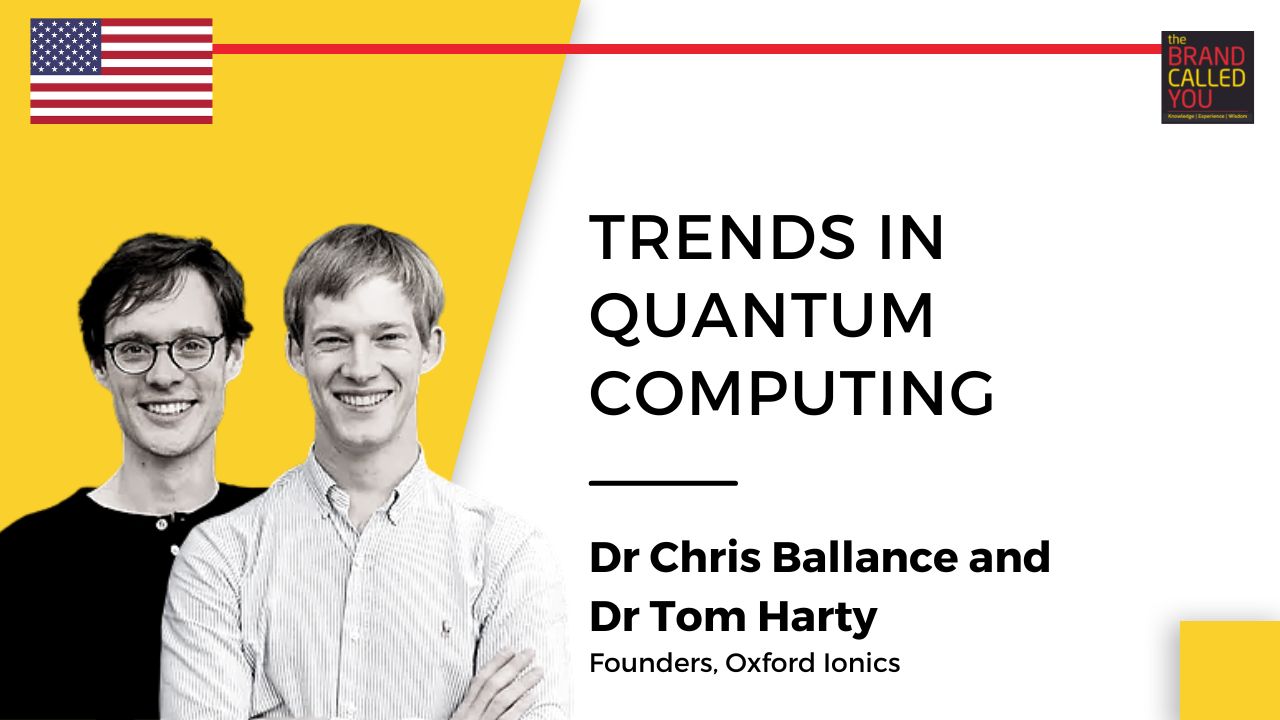Dr. Chris Ballance and Dr. Tom Harty | Founders, Oxford Ionics
- Chris and Tom have been working together at the forefront of Quantum Computing for over a decade.
- They earned their PhDs in Quantum Computing from the University of Oxford focusing on trapped ion quantum computing.
Podcast
Overview
Quantum Computing has garnered attention for quite some time now, but the concept remains too technical for the common man to understand. In this episode, our two guests, who are physicists and have done Ph.D. in Quantum Computing from the University of Oxford, break down the everyday applications of quantum computing. Tune in now, to understand more about the scope and trend of this hot technology.
[00:10] – About Dr. Chris Ballance and Dr. Tom Harty
- Chris and Tom have been working together at the forefront of Quantum Computing for over a decade.
- They earned their PhDs in Quantum Computing from the University of Oxford focusing on trapped ion quantum computing.
- They founded Oxford Ionics in 2019 to continue the journey towards world-changing quantum computers.
- Tom joined the ion-trapping research group at Oxford to start his Ph.D. in Quantum Computing in 2009, and Chris the year after in 2010.
- They’ve also collaborated with other UK academic institutions involved in the field, notably on the NQIT program, a grand challenge inside UK academia to build a quantum computer, which ran from 2014 to 2019, and was succeeded by the Quantum Computing & Simulation Hub.
[07:45] – What are some foundational areas now that you’re seeing in quantum science, quantum information, science, and technology?
- We are at this really exciting phase now where we are at the end of the beginning, that we now know roughly how the chessboard is laid out, what everyone has to work with, and where everyone’s struggle is going to be to get here.
- Like in any technology, nothing’s ever perfect. But there are some kinds of problems you can see your way through and some kinds of problems that look more existentially scary.
- What I really say about quantum computing is that 20 years ago, it all looked impossibly hard. There was a big question about is this ever going to be possible.
- 10 years after that, it got to the point where it was clear that it was probably possible, but it was very ambiguous whether it was going to be practical in the phase where we can probably make, power size, timeline cost assumptions, and really start doing engineering.
- No one had shown quantum devices can be operated at the performance level, where you could even have them start correcting their own errors and bootstrap up.
- For us, crossing this point where we demonstrated for the first time in small iron trap devices, that we could get the performance levels up to the point where you could start doing error correction, was really exciting.
- Now we’re starting to do the fun engineering, about how you make trade-offs in this very complex landscape.
- The big thing you need when you want to build a quantum computer is a system that behaves nicely quantum mechanically.
- What you require is something where you can do quantum gates with low areas.
- When you look around the different landscapes, different technologies, and say, what’s the one that’s got the lowest errors, this has kind of always really been the trapped islands.
RESOURCES:
Learn more about Dr. Chris Ballance: LinkedIn
Enjoy this podcast?
If you learned new insights about quantum computing, subscribe and share it with friends!
Love to give us 5 stars? ⭐⭐⭐⭐⭐ If you do, we’d love a review from you. Help us reach more people to keep them in the know as we talk to leaders, high achievers, and thought leaders from diverse backgrounds and nationalities. Excellence can come
from anywhere; stay in the know, and hear from emergent high achievers and gurus.
Stay updated with what’s shaping the world today through the latest The Brand Called You Podcast episode. Follow us on iTunes, Spotify, and Anchor.fm.
You can find us at:
Website: www.tbcy.in
Instagram: http://bit.ly/3HO7N06
Facebook:http://bit.ly/3YzJOaD
Twitter: http://bit.ly/3wMBOXK
LinkedIn: https://www.linkedin.com/company/tbcy/
YouTube: http://bit.ly/3jmBqfq
Chingari: https://chingari.io/tbcypodcast
Josh: http://bit.ly/3WWP0nB
Thanks for listening!
Profile
- Chris and Tom have been working together at the forefront of Quantum Computing for over a decade.
- They earned their PhDs in Quantum Computing from the University of Oxford focusing on trapped ion quantum computing.
- They founded Oxford Ionics in 2019 to continue the journey towards world-changing quantum computers.
- Tom joined the ion-trapping research group at Oxford to start his PhD in Quantum Computing in 2009, and Chris the year after in 2010.
- They’ve also collaborated with other UK academic institutions involved in the field, notably on the NQIT program, a grand challenge inside UK academia to build a quantum computer, which ran from 2014 to 2019, and was succeeded by the Quantum Computing & Simulation Hub.


